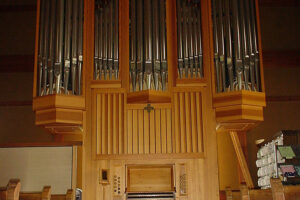How We Should Pray

October 20, 2019
Jeremiah 31:27-34: 2nd Tim. 3:14-4:5. Gospel: Luke 18-1-8.
Fr Michael Pye
I have quite often asked people how they pray, and indeed I have often asked myself. For there are many ways of praying, and it is a good idea to think about them from time to time. How should we pray? What should we pray for? What should we pray about? Should we pray for some things, but not for others? Should we pray aloud? Or Should we pray in silence? Should we pray together? Or should we pray alone? Should we pray like children? Or should we try not to pray like children? What happens if our prayer seems to dry up? What is the difference between prayer and just wishing for things? What is the difference between prayer and just thinking about things? Does anybody listen? In the great silence of the universe, is anybody there? If we walk with God, where is God? If God is not a human being [or even a superhuman being] how can he or she listen? So many questions about prayer! Thinking about prayer leads us into the deepest questions about our faith, and about the very nature of God and life as we know it.
The story in today’s gospel offers just one piece of advice about prayer. “Don’t give up.” It may seem that there is no answer to our prayer, but that does not mean that there is really no answer. The human judge in the story did not really care about the widow or her need for justice. Indeed, we are not even told what she expected. Somehow, she had been treated badly, and she just wanted justice. The judge found her persistence quite tiresome. He just took some kind of decision, so that she would go away and leave him in peace.
Now God is not like the judge. The human judge was unpredictable, and he just made decisions for his own convenience. By contrast, God is reliable. He will surely bring about justice for his chosen ones, we are told… Who are his chosen ones? [That may sound selective, but it is not. It means all those who wish to enter the kingdom of God. They are the ones who are “chosen” as (in Matthew’s words) “the true Israel.” This is a universal offer, open to all.] They are those who wish to enter the kingdom of God, those who cry out to him day and night. We should do that. In that way we can follow the example of the widow. In that sense our prayer, our response to God, should continue unceasing, whether spoken or not. Don’t give up!
Let’s remember that in the Lord’s Prayer, there is only one practical request or petition: “Give us this day our daily bread.” There are places in the world where people do not actually get their daily bread, so it makes sense to pray for it. But in our case, in Japan, we all have a food supply and so we hardly need to ask for it. On the other hand, we can be grateful for it. So when we say “Give us this day daily bread” I suggest that we think of others who do have difficulty in getting their daily bread; and in our own case that we think of it as a kind of thank you. It is certainly good to have a sense of gratitude for blessings of all kinds. But notice that the other parts of the Lord’s prayer are not practical requests at all. They are all about our life with God and with others. In this way we learn, from Jesus himself, that prayer is, above all, a spiritual matter.
People pray for all kinds of things. Not only in churches. In the shrines and temples of Japan many people are praying for different sorts of things. Very often they pray for themselves and their families, they pray for health, for safety and traffic, for success in examinations, for a good marriage,[and for many other things,] in fact just whatever they want. This is not bad. And when people pray for the welfare of others, it’s good. They may even pray for the welfare of all, as when we pray for peace in the world. Indeed, we Christians also pray for many things which affect our lives, for safety, for success, for the end of a war. for healing and even for miracles.
But this is just one level of prayer: asking for things. We also need to think of prayer in other ways. We know this because, after all, just because we ask for things it doesn’t mean that we get them. Some people might pray for their children to pass examinations and even pay money to a Shinto shrine, just in case it is helpful! But will the kami listen? If they pay more money, is it more likely to happen? Another example: I might pray for pain in my leg to be taken away, but it doesn’t mean it will happen. Perhaps yes, but perhaps not. I believe we must lift our prayers to a different level. How do we do this? Briefly, I think we do it by placing our concerns into the hands of God.
At the very end of today’s Gospel passage, in verse 8, we find a very special question: “Yet, when the Son of Man comes, will he find faith on earth?” (This is not the main point of the parable, as some simplistic commentators say.) This is one of the so-called “Son of Man” sayings. These sayings give us a perspective in the future. They point to Jesus as a powerful cosmic figure who has won the victory over suffering and wrong. When we speak of “his coming again” we express the hope, and the faith, that things will come right in the end. God will bring about justice, in the end. Without that hope we are lost. Often it does not seem that things will come right in the end. We learn that the kingdom of God is not immediate and automatic. We need to seek it, work for it, and pray for it, as when we say, “Your kingdom come.” And in this sense too we say, as Jesus taught us, “Your will be done on earth, as it is in heaven.”
We must remember that Jesus had himself been proclaiming the coming of the kingdom of God. And see what happened. His way led through the crucifixion. For us too, things can sometimes seem so difficult. There are wars, and disasters like typhoons and earthquakes, there are sad or wrong things that can happen in the lives of our families, disappointments and worries, illness and the weakening of the body. And so, apart from the Lord’s Prayer, how shall we pray? What can we put into words? St Paul teaches us that the Holy Spirit of God himself comes to the aid of our weakness. He says: “We do not even know how we ought to pray, but through our poor groans the spirit himself is pleading for us; and God who searches our inmost being knows what the spirit means, [because he pleads for God’s own people in God’s own way.]” (Rom. 8:26-7) So do not worry about how to pray. Let the Holy Spirit speak for us through our hearts and minds. Let us open ourselves to the will of God, and to his promise of the kingdom.
We heard in the Gospel, “And will not God grant justice to his chosen ones who cry out to him day and night?” This means we must “pray without ceasing”. And how can we do that? After all, we often have to think about other things. So how can we pray without ceasing? People sometimes speak of “walking with God” (kamisama to ayumu). It means living in the perspective that everything, somehow, can be placed in his merciful hands, night and day, day and night. This is the deepest form of prayer. As we continue our service, let us pray in such a way. Amen.













